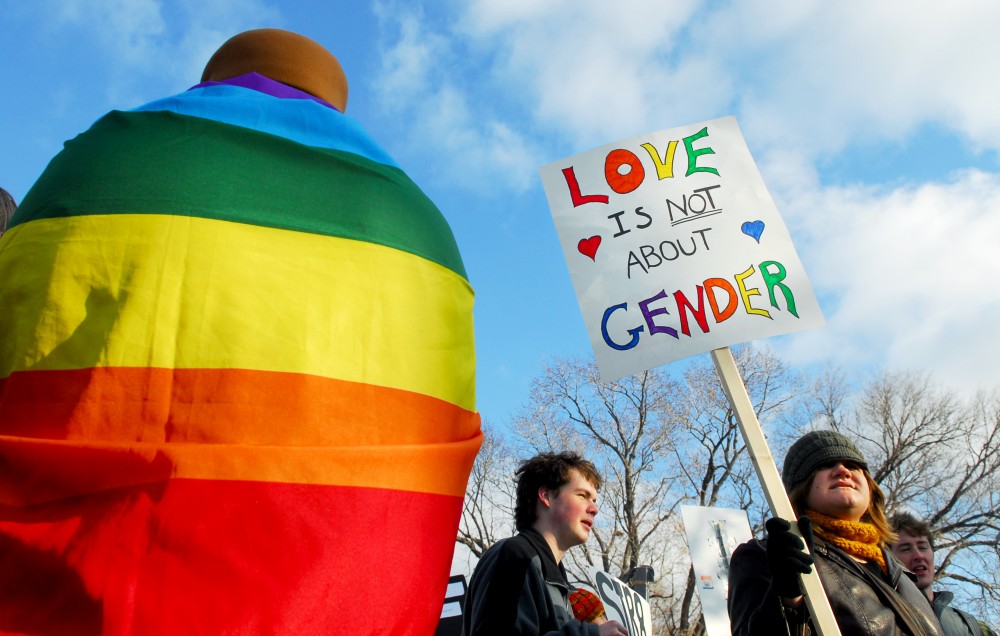Armed with banners and signs, more than 1,000 people marched from the Government Center Plaza in downtown Minneapolis to Loring Park on Saturday, in opposition to a California constitutional amendment that banned gay marriage. Called Proposition 8 , the amendmentâÄôs unexpected passage in solidly Democratic California on Nov. 4 shocked many in the gay community âÄî a diverse group that even struggles with what to call itself; some members call themselves âÄòqueerâÄô while others use âÄògayâÄô or âÄòGLBTâÄô (gay, lesbian, bisexual, transgender). Even though it wonâÄôt legally affect gay people in Minnesota, who also arenâÄôt allowed to marry, although gay marriage isnâÄôt banned in MinnesotaâÄôs constitution, Proposition 8, or as some young people refer to it, âÄòProp Hate,âÄô is a measurement of straight AmericansâÄô view on gay Americans, Anne Phibbs, director of GLBTA programs office at the University of Minnesota said. âÄúItâÄôs significant for the community and the University of Minnesota because it brings forward a national debate about where our country is on issues of equity and equality for GLBT Americans,âÄù she said. Exempting gay people from marriage creates practical problems for gay couples, said Phibbs, who has been an âÄúout lesbianâÄù for almost 30 years. âÄúItâÄôs a denial of civil rights,âÄù she said. âÄúThere are rights that are impacted in terms of children and how family is understood, financial rights, access to health care, access to health insurance and benefits.âÄù The protests, which took place in dozens of cities nationwide Saturday, serve as a way for the gay community to come together, said Phibbs, who planned to attend the protests with her children. But they also serve to send a message to Americans, regardless of their sexual orientation. âÄúTo those people who see us as different from others, as say, a threat to the American family, I want to âĦ say, well I am an American family,âÄù she said. âÄúMy personal values of equality for all people and respect and working hard and trying to be an engaged citizen of the United States of America âÄî those are not antithetical to our traditional notions of family and what it means to be an American.âÄù Protest organizer Jessica Rosenberg said Proposition 8âÄôs passage brought together a diverse gay community that often has little in common. âÄúIf thereâÄôs a group of old gay men who want to get married and a group of young punk dykes who want to take down patriarchy, I know these groups donâÄôt have much in common,âÄù Rosenberg said, âÄúbut hey, homophobes donâÄôt see the difference.âÄù Proposition 8, viewed by opponents as a civil rights issue, created an uproar after black people, who turned out in huge numbers to support President-elect Barack Obama, also voted in support of the gay marriage ban at a rate of 70 percent. Rosenberg said she was drawn to organizing the protest even though gay marriage isnâÄôt her main activist focus. She said she got involved because people in the gay community, especially on the Internet, were blaming blacks for the amendmentâÄôs passage. âÄúI donâÄôt think itâÄôs a bad idea to look at the breakdown of who voted for what,âÄù she said. âÄúBut mostly we need to look at where we as a movement failed to build bridges and to organize.âÄù Rather than being discouraged by the amendmentâÄôs passage, young gay students, who didnâÄôt have much interest in the issue before the amendment, say they feel spurred to action and inspired to reach out to people in demographics that supported the anti-gay marriage amendment. Allison Witham , a theater and English junior, said the amendmentâÄôs passage was disappointing, but also served as an awakening for young people in gay-friendly cities. âÄúI think it reminds people of how important it is [to go to] places that arenâÄôt gay friendly at all,âÄù Witham said. âÄúIt shouldnâÄôt be something that should come easy to us but itâÄôs something that has to be fought for.âÄù For many young gay people, gay marriage has taken on a significance that it didnâÄôt have before Proposition 8, Witham said. âÄúIt is a basic right to pass on wealth to your partner or be able to see your partner in the hospital or buy a house with somebody that youâÄôve been with for years,âÄù she said. In order for the publicâÄôs perception of gay marriage to change, straight people also need to get involved, political science junior Rachel Struckmeyer said. âÄúIâÄôd like to see more people getting involved in this, IâÄôm not talking about the queer community, but allies,âÄù she said. âÄúWeâÄôve kind of enclosed ourselves as a group and we need to start branching out.âÄù Phibbs said the protests are a first step in the gay communityâÄôs reactions to the marriage ban currently facing legal challenges in California. âÄúI know thereâÄôs anger and I know people are hurt, [but] I fundamentally believe that out of this will come more activism,âÄù Phibbs said, âÄúand thatâÄôs always a good thing.âÄù
Gay community inspired to action by California ban

Image by Tara Sloane
Gay Rights Protest – downtown Minneapolis
Published November 16, 2008
0
More to Discover







